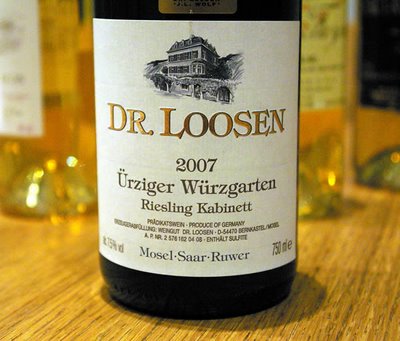The death of Kabinett...almost

Germany’s Mosel region, which produced some of the world’s best Riesling, uses a classification known as the Prädikat system, which is a hierarchical system with six different levels based on the ripeness of the grapes. When this was introduced, in 1971, the problem was getting the Riesling grapes ripe, and only the best fruit from the best sites got into the Spätlese and Auslese wines (the levels above this, Beerenauslese and Trockenbeerenauslese, relied on the concentrating effect of botrytis). But now, the effects of global warming mean that sugar levels are rising in the grapes, and the lowest end of the classification, Kabinett, is in danger of extinction. This is because the great vineyard sites are turning out grapes that have higher sugar levels than those you’d normally associate with Kabinett.
Is this a problem? Yes, if like me, you love Kabinett Rieslings. They’re fantastically fresh, with lovely tension between the high acidity and the sweetness. They are bright enough to go really well with food, as well as being good for casual sipping. Nowhere else in the world can make Riesling in such a focused yet light style. And because they are at the bottom end of this hierarchical system, they are also affordable.
These days, many of the Rieslings labeled ‘Kabinett’ are actually far sweeter and richer than the traditional Kabinett style. It’s perfectly legal to pick Riesling grapes at Spätlese levels of sweetness and then declassify these to Kabinett, but what’s the point of doing this? It invalidates the Prädikat system. Today’s wine is a Riesling Kabinett that tastes like Kabinett, from Dr Loosen, whose US office recently sent out a press release highlighting the problem that Kabinett faces. Loosen’s response has been to release a new Kabinett without a vineyard designation, based on less exalted vineyard sites where the grapes don’t get quite so ripe. “Kabinett is the lightest, most delicate style we produce,” says Loosen, “but in recent vintages our grand cru sites have become too warm. So we’ve gone to cooler sites to find the fruit we need to keep the true Kabinett style alive.” But he has shown with his regular Kabinetts that he is keen that a wine labelled as a Kabinett should actually taste like one, which is a good thing.
Dr Loosen Ürziger Würzgarten Riesling Kabinett 2007 Mosel Saar Ruwer, Germany
A delightfully bright example of Kabinett, with a lovely aromatic, fresh lemony, flowery, honeyed nose. The palate has a brilliant balance between the sweet tropical fruit and the high grapefruity acidity, with some spicy complexity and lovely precision. Fruity, fresh and low in alcohol (7.5%), this is the perfect lunchtime wine, but it’s also great for casual sipping, and would work well with light seafood dishes. Just off-dry, but still very fresh. 90/100 (£11.99 Waitrose, Booths)
Is this a problem? Yes, if like me, you love Kabinett Rieslings. They’re fantastically fresh, with lovely tension between the high acidity and the sweetness. They are bright enough to go really well with food, as well as being good for casual sipping. Nowhere else in the world can make Riesling in such a focused yet light style. And because they are at the bottom end of this hierarchical system, they are also affordable.
These days, many of the Rieslings labeled ‘Kabinett’ are actually far sweeter and richer than the traditional Kabinett style. It’s perfectly legal to pick Riesling grapes at Spätlese levels of sweetness and then declassify these to Kabinett, but what’s the point of doing this? It invalidates the Prädikat system. Today’s wine is a Riesling Kabinett that tastes like Kabinett, from Dr Loosen, whose US office recently sent out a press release highlighting the problem that Kabinett faces. Loosen’s response has been to release a new Kabinett without a vineyard designation, based on less exalted vineyard sites where the grapes don’t get quite so ripe. “Kabinett is the lightest, most delicate style we produce,” says Loosen, “but in recent vintages our grand cru sites have become too warm. So we’ve gone to cooler sites to find the fruit we need to keep the true Kabinett style alive.” But he has shown with his regular Kabinetts that he is keen that a wine labelled as a Kabinett should actually taste like one, which is a good thing.
Dr Loosen Ürziger Würzgarten Riesling Kabinett 2007 Mosel Saar Ruwer, Germany
A delightfully bright example of Kabinett, with a lovely aromatic, fresh lemony, flowery, honeyed nose. The palate has a brilliant balance between the sweet tropical fruit and the high grapefruity acidity, with some spicy complexity and lovely precision. Fruity, fresh and low in alcohol (7.5%), this is the perfect lunchtime wine, but it’s also great for casual sipping, and would work well with light seafood dishes. Just off-dry, but still very fresh. 90/100 (£11.99 Waitrose, Booths)


2 Comments:
So isn't this a curse in disguise for German wine producers? If the region is getting warmer, doesn't that mean vineyards that used to only produce Qba wines will potentially be producing QmP wines if global warming becomes worse?
Global warming is a bad thing, of course. I love Kabinetts, and hope they won't go extinct ever.
Kabinett wines are really becoming rare beast in Germany, but it's also the case here in Czech Republic. Everything is now high "prädikat", to heavy, with residual sugar. To find balanced ligher dry kabinet you can drink all evening is becoming like hunt for holy grail. Just wondering how much it is because of global warming and what part is just people liking sweet wines more and also "we can get more money for higher prädikat" factor...
BTW I love Dr. Loosen's basic Reisling, Dr. L. It's nor expensive and yet great example of place of origin and varietal.
Post a Comment
Links to this post:
Create a Link
<< Home